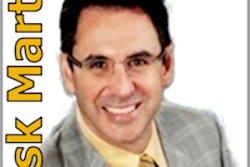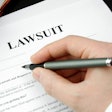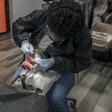
It took more than a dozen years and numerous trips to court -- nearly all the way to the U.S. Supreme Court, in fact -- for Florida dentists to finally claim victory in their efforts to overturn a law restricting advertising of their credentials.
— Frank Recker, D.D.S., J.D.,
attorney for the American Academy
of Implant Dentistry
On April 3, in response to a lawsuit filed by Francis DuCoin, D.M.D., et al against the Florida state surgeon general et al, Circuit Court Judge Frank Sheffield ruled that Section 466.0282 of the Florida statutes -- which prevents advertising of membership in, or credentials earned from, any dental organization not recognized by the Florida Board of Dentistry (FBD) -- violates the First and 14th Amendments of the U.S. Constitution.
The ruling could have national implications, according to Frank Recker, D.D.S., J.D., attorney for the American Academy of Implant Dentistry (AAID), one of the professional organizations that has lent its support to the plaintiffs in this legal action.
"These issues have been going on for a very long time all over the country," agreed Laurence Jerrold, D.D.S., J.D., legal editor for the American Journal of Orthodontics and Dentofacial Orthopedics and dean of the Jacksonville University School of Orthodontics in Florida. "The state dental board is now going to have to figure out what they are going to allow and what they aren't going to allow."
Like dental boards in other states, the Florida dental board only recognizes credentials issued by specialty organizations recognized by the ADA. Thus, implant dentists in Florida credentialed by the AAID (or its certifying board, the American Board of Oral Implantology/Implant Dentistry (ABOI/ID) who wanted to advertise their credentials had to include the following "onerous disclaimer" about those credentials -- specifically (and in capital letters):
THE AMERICAN ACADEMY OF IMPLANT DENTISTRY IS NOT RECOGNIZED AS A BONA FIDE SPECIALTY ACCREDITING ORGANIZATION BY THE AMERICAN DENTAL ASSOCIATION OR THE FLORIDA BOARD OF DENTISTRY.
The advertisement was also required to include "IMPLANT DENTISTRY IS NOT RECOGNIZED AS A SPECIALTY AREA BY THE AMERICAN DENTAL ASSOCIATION OR THE FLORIDA BOARD OF DENTISTRY."
These same requirements applied to dentists with credentials in other non-ADA-recognized special interest areas of practice, such as cosmetic dentistry (American Academy of Cosmetic Dentistry [AACD]) or general dentistry (Academy of General Dentistry [AGD]).
While everyone acknowledges that public safety and welfare are paramount, the issues surrounding what constitutes fair advertising prompted the AAID, AGD, and AACD to get involved. Any dentist in Florida, for example, can advertise "implant dentistry," Dr. Recker noted. But if an AAID-certified dentist wants to include their credentials in the ad, they have to include the state-mandated disclaimer as well.
"This all started in 1994 when, on behalf of the AAID, I went to Tallahassee and appeared before the state dental board in a hearing to seek a formal declaratory order," Dr. Recker told DrBicuspid.com. "I demonstrated that my client had credentialing processes that were very strict and very rigorous, [and was] seeking permission to freely advertise them. Shortly thereafter, the board issued a formal Declaratory Order stating that dentists could advertise their bona fide credentials."
But the Florida Dental Association (FDA) "went ballistic," Dr. Recker said. "They tried to get the board to reverse themselves and, failing that, ultimately lobbied for the passage of a statute that was struck down by a federal court in 1998."
In 1999, the dental association again went back to the state Legislature and lobbied for the passage of another statute (466.0282). That statute initially ended up in federal court, where the plaintiffs again won and the defendants appealed, Dr. Recker said. They won that appeal, and that's when the U.S. Supreme Court stepped in -- almost.
"In 2002, when the issue of whether our case should be heard by the U.S. Supreme Court was presented to the court, two justices (Ginsburg and Thomas) said they wanted to hear it, but they were voted down," Dr. Recker said. "So they wrote a minority opinion saying they dissented with the majority on whether or not to accept the case."
In March 2003, a new case in which several credentialed dentists were plaintiffs was filed in Florida state court, and, after six years of litigation, it went to trial before Judge Sheffield.
Dental groups respond
In addition to his April 3 ruling that the statute is unconstitutional, the judge chastised the state Legislature and state associations for not taking a stronger position with the ADA.
"Of great interest to the Court is that the challenged statute delegates to the ADA the sole discretion to designate what specialties or specialty credentialing organizations will be recognized by the FBD and enforced under the law of this state," Judge Sheffield wrote in his decision. "The ADA refuses to recognize the AGD, AACD, AAID, and ABOI as certifying boards, and consequently advertising those credentials, without the disclaimer, violates Florida law. In fact, under Florida law, the Legislature may not delegate unguided and uncontrolled authority to a private organization to determine prospectively the lawfulness of commercial speech."
"This is all about turf wars," Dr. Recker told DrBicuspid.com. "Virtually every state in their statutes defers to the ADA on some things, and this judge said, 'You cannot delegate the state's power to a private trade association.' "
In response to the ruling, Florida Dental Association President Ted Haeussner, D.M.D., issued the following statement:
Last week, a state circuit court in Leon County, concluded that Florida's dental specialty advertising law (section 466.0282, Florida Statutes) is unconstitutional. As a practical matter, the Florida Board of Dentistry has not enforced the statute since the lawsuit was filed in 2003. This order means the Florida Board of Dentistry is now permanently barred from enforcing the statute.
The state court ruling does not repeal or nullify other laws that prohibit consumer fraud or, for example, untrue statements made by dentists for the purpose of financially exploiting patients, he added. Also, the guidelines for advertising set forth in the ADA/FDA Principles of Ethics and Code of Professional Conduct remain intact, he noted.
However, the state court ruling does appear to contradict a previous federal court opinion that upheld the constitutionality of section 466.0282, Dr. Haeussner added.
"At this point, the Florida Department of Health has made no public announcement on whether it will appeal the decision," he noted. "The FDA is not in a position to appeal the ruling because it was not a party to the lawsuit."
The ADA also issued a statement:
The DuCoin decision concerns an interpretation of Florida law, which is first a matter for Florida authorities to comment on. The American Dental Association provides ethical guidance to its members, but is not a regulatory agency. Whether an individual qualifies to practice dentistry and the rules governing dental practice are matters of state regulation flowing from the state's obligation to protect its residents.
For dentists in Florida with bona fide credentials in the AAID, AACD, and AGD, who had stopped advertising their credentials out of fear, Dr. Recker said, the ruling represents "a bright day." In fact, he hopes the DuCoin decision is appealed so that the case can again go before higher courts, potentially both state and federal.
"Effective immediately, [dentists in Florida] can advertise their credentials without the onerous disclaimers," he said. "In this day and age, to think about preventing public access to this information is embarrassing to the dental profession."
Copyright © 2009 DrBicuspid.com



















